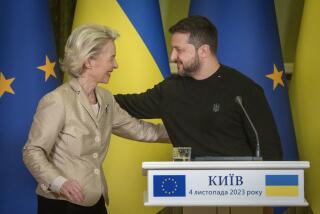Rising From Red Ruins
- Share via
The fall of the Berlin Wall 10 years ago, symbolizing the collapse of Communism in Europe, freed the Eastern bloc countries to pursue their own economic and social dreams. With high hopes, they set out in the same general direction--market economies and some form of representative democracy. A decade later, some have gone far while others lag. But the demise of Communism has changed all of them, and much of the rest of the world. Without the superpower rivalry the chances of a nuclear holocaust have markedly diminished, and the world is a far safer place.
The dismantling of the Communist regimes in the fall of 1989 was remarkably quick and peaceful. With the exception of Romania, where hundreds, perhaps thousands, died battling the military and security forces, the Soviet bloc governments toppled like dominoes. Everything was possible in those heady days when dissident playwrights became presidents.
For the record:
12:00 a.m. Nov. 13, 1999 For the Record
Los Angeles Times Saturday November 13, 1999 Home Edition Metro Part B Page 7 Metro Desk 1 inches; 24 words Type of Material: Correction
Fall of the wall--An editorial Monday on the breakup of the Soviet bloc should have said that Vaclav Havel is the present as well as the former president of the Czech Republic.
But uprooting regimes built on discredited Marxist theories turned out to be the easy part. Replacing them with a more just, prosperous society has proved to be far more difficult.
Transition from the old regime to the new became a continent-size experiment, as each country tried its own way to rebuild. Ten years on, the countries with the most radical plans--those that dumped not only the old dogmas but much of the old guard as well--have done best. Others, including most of the republics of the former Soviet Union, have accomplished little more than a change of labels. They still run their economies on the same corrupt principles of the past.
Even the countries with the most far-reaching reforms were devastated by the collapse of the centrally planned economies and the disintegration of trade among them. Their gross domestic products plunged by a third on average, and some are still trying to reach pre-1989 levels. But now they are beginning to reap the benefits. Last year, the Czech Republic, Estonia, Hungary, Poland and Slovenia were accepted as candidates for membership in the Western-based European Union and are expected to join within two or three years.
Other countries, spurred by the prospect of joining the European fold, have accelerated the pace of reforms. Among them are Bulgaria, Latvia, Lithuania, Romania and Slovakia. All five will probably begin membership negotiations next year.
But the list of losers is just as long. It includes countries like Belarus, Ukraine, Kazakhstan, Uzbekistan, the rest of Central Asia and the Caucasian republics. In most of these now-independent countries, the old Communist bureaucrats--the nomenklatura--remained in power, controlling vast swaths of the economy. Under the guise of privatization, they took control of state enterprises, stripped their assets and pocketed the proceeds. A result: The odds that Ukraine, the only European country with a Ministry for European Integration, will join the EU any time soon are slim.
Despite the unexpectedly severe economic hardship and the disillusionment with government policies, most Eastern bloc countries, including Russia, have come to accept democracy. The voters take it out on the politicians at the ballot box, instead of at barricades, often bringing even the old Communists back into power if other parties fail to deliver.
The moral scars of Communism will take a long time to heal, but the foundation of what former Czech President Vaclav Havel calls “civil society” has been laid and a useless system buried.
More to Read
Sign up for Essential California
The most important California stories and recommendations in your inbox every morning.
You may occasionally receive promotional content from the Los Angeles Times.













